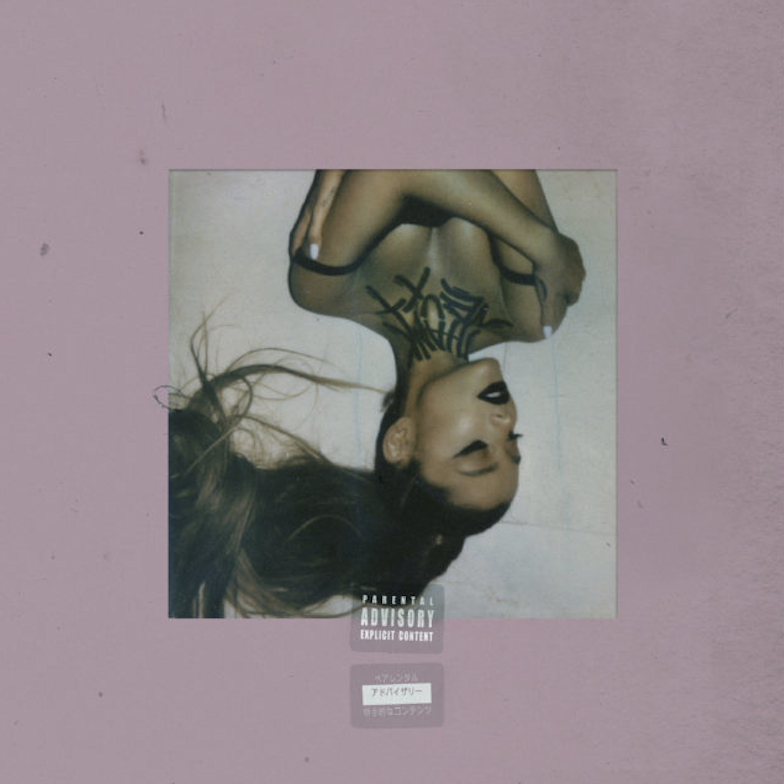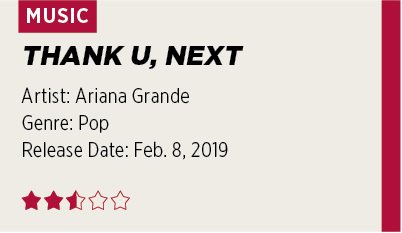Ariana Grande reveals dark side on ‘Thank U, Next’


Some say pain makes for the best art. Some say true inspiration comes from the cathartic process of expelling one’s demons in healthy ways. Coming less than a year after the release of “Sweetener,” Ariana Grande attempts just that on her latest album — to rid herself of a tumultuous past.
With just 12 tracks, “Thank U, Next” leaves little room for error. A tightly woven project like this cannot include skippable songs or risk losing the listener’s attention. Unfortunately, this is the case from the start. The album opener — the previously released “Imagine” — is an underwritten and overproduced ballad that laments the loss of a relationship. Grande’s vocals shine, but digging for further depth leaves listeners disappointed.
This superficiality continues on “Needy” and “NASA,” both forgettable tracks with little originality.
“Needy” revolves around Grande’s clingy mentality in relationships, while “NASA” conversely presents a frustrated Grande needing space — through a too-obvious-to-miss metaphor of NASA and literal space.
“I’ma need space, I’ma need space / N-A-S-A,” Grande quips.
The issue with both tracks lies not merely in their shallow lyrics, but rather in their lackluster production. “Needy” features a monotonous dreamscape (the likes of which were greatly improved upon in the later track, “Ghostin”), while “NASA” offers a cookie-cutter pop cadence. Tracks like these must make up for simplistic lyrics with compelling instrumentals, but both fail to provide exciting or fresh sounds.
The first sign of excitement on the record comes in the excellent, single-ready “Bloodline,” a tropical, horn-assisted banger. Grande cleverly toys with a lover here, jesting, “Don’t want you in my bloodline, yeah / Just wanna have a good time, yeah.” It’s also the first moment on the record when Grande herself seems to be having fun.
The midsection of the album offers almost no compelling material, with Grande hovering over subject matter like fame-induced suffocation, misdirected self-medicating and rekindling romance.
What sounds like a compelling array of topics is watered down by slang-driven lyricism replaced by the type of pop music that digs its claws into the consciousness, whether the listeners wants it to or not. Ultimately, Grande’s songs fail to offer listeners profound insight into the life of Grande.
The track “Ghostin,” however, offers a deeper look into her psyche, vulnerably conveying her turmoil at what seems to be the end of her relationship with comedian Pete Davidson. The track is beautifully produced and well-intentioned, though its adherence to the aforementioned contemporary internet slang (like the practice of “ghosting”) discredits the otherwise artful subject matter.
The last third of “Thank U, Next” props up the entire album. The trap-influenced “In My Head” savagely, and at times distastefully, laments a relationship Grande unintentionally manipulated into seeming like more than it was.
“I had a vision of seeing what isn’t there,” she recalls in the second verse.
Ilya and Max Martin assist with the album’s production. “In My Head” closes with a thought-provoking outro reminiscent of Lorde’s “Melodrama.”
The finale sends the project off on a high note with Grande’s holy trinity of hit singles: “7 Rings,” “Thank U, Next” and, most recently, “Break Up With Your Girlfriend, I’m Bored.” The two previously released tracks find new meaning in the context of the tracklist, showcasing Grande’s growth and healing process despite the pain evident in the front half of the project. She hints at an exciting year with the closer “Break Up With Your Girlfriend, I’m Bored.” It’s stylish, playful and brings out Grande’s cool confidence.
“Thank U, Next” is by no means the masterpiece that fulfills the world’s high expectations. Its lyrics encapsulate the lack of substance perpetuated in mainstream music today. The album’s production is, for the most part, decidedly standard.
What makes “Thank U, Next” a worthwhile listen, however, is Grande’s ability to concede vulnerability and own up to her mistakes.
Dark and honest, the slim collection paints a portrait of a celebrity in an incredibly difficult position personally and publicly. The closing moments of the album present her strength and resilience — themes that naturally bookend an album desperately trying to be more profound than it is.

